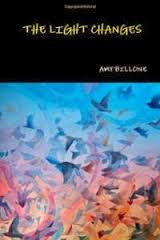Amy Billone’s poetry collection THE LIGHT CHANGES is a four-part cycle, starting with a suicide attempt and ending with the birth of a child. Along the way, the poems cover a wide range of subjects, some of them sad and some kind of funny, but they almost always come back to her relationship with her father, which serves as the emotional heart of the book.
Billone seems to owe a lot to confessional poets like Sylvia Plath, as in the frankness of the imagery in the suicide poems, and its love of the internal rhyme. And like with Plath, the subject matter is intense and heart-rending, but also like with Plath, the poems are far more emotionally complicated than they first appear to be. “Insomnia,” for instance, laments how trying to pull away from your father can make you more like him (“Me my father shame of stems together”), and “Elegy for Jack Gilbert” is a poem that puts a relationship with someone with Alzheimer’s so very lyrically: “When he stepped out of / my car he smiled and said he enjoyed talking with me because I was so naked. I wondered if he’d remember our conversation. Why am I ashamed to admit this? I wanted him to know my name.”
One of the amazing things about THE LIGHT CHANGES is how subtle the ways are in which it works its magic. The poem “Why I Did Not Stay to See the Second Half of Shakespeare’s Henry V,” for instance, uses a woman’s menstrual cycle as a subtle political metaphor, in a way that’s both funny and kind of unique. “My Father Said” casts her father as a detective filing a police report, and then slowly begins to betray his emotion. “Death Valley” is a poem about depression that’s so subtle that you don’t even realize what it’s really about until shortly after you’ve finished reading it.
THE LIGHT CHANGES is a great volume of free verse, sometimes devastating and sometimes enlightening, being very straightforward and honest in the way it talks about suicide, but also reminding us that it’s (hopefully) better to live; and doing it all in an eloquent, beautifully crafted voice that would make this book stand out in of itself.
Reviewed by Charles Baker for IndieReader.com
